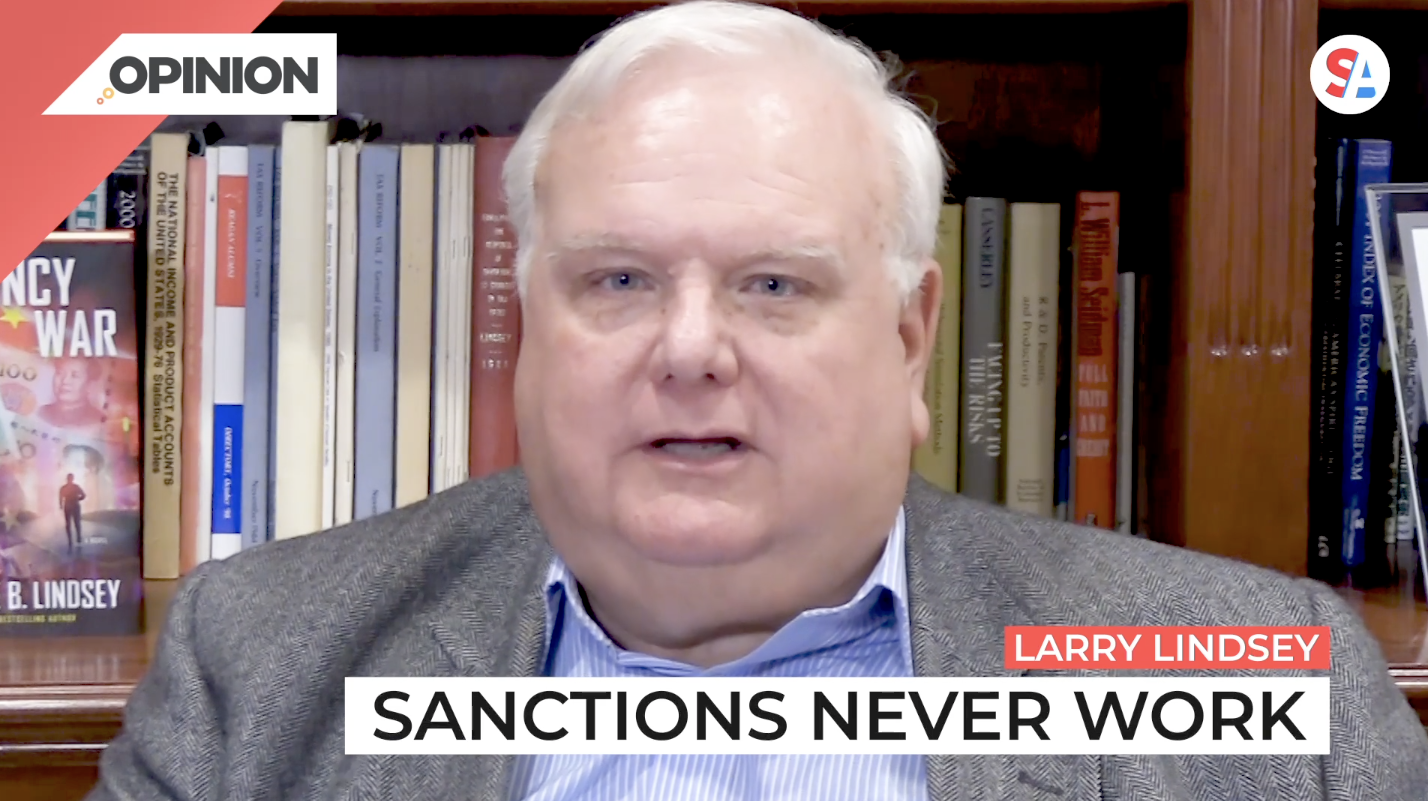
Commentary
-
Our commentary partners will help you reach your own conclusions on complex topics.
There’s a lot of talk about sanctions lately, particularly on Russia. It is the plan of the administration and some of our European allies that we will put on devastating sanctions, some call them unprecedented sanctions in order to stop the Russians from invading Ukraine.
Well, the Russian UN ambassador said, we’ve been sanctioned so many times, we’ve lost count, we’ve learned to live with it. And he has a point.
It’s not whether they deserve to be sanctioned or not. I probably think they do, but it’s that we in the west and in America really never get our act together when it comes to sanctions.
The Senate, for example, has been working on a sanctions bill and they just managed to not come up with one. There wasn’t any real partisan disagreement, but they couldn’t decide on what sanctions to impose.
Then you can think back to the sanctions before the Iraq war. We imposed them on Saddam Hussein who had broken UN security council resolutions.
They seemed tough, but our European allies, particularly the Germans, simply found a way of getting around them. They had something called the oil for food program. Saddam sold the oil to the Germans and supposedly money that was going to be used for food for the Iraqi people. Instead, it went into Saddam’s pocket and those of his family and his henchman.
Then in 2014, Putin invaded Ukraine before he took Crimea, which is a peninsula in the Black Sea, on the Southern coast of Ukraine.
President Obama said, we’re imposing sanctions, this will not stand. Well, here we are eight years later, and it’s still standing. Those sanctions didn’t work.
Or then there’s the famous Iran sanctions. Yes, we’ve tried to sanction Iran, but we never seem to be able to stick to it. Most recently, the administration announced that it will end its sanctions on the civilian part of the Iranian nuclear program. There is no difference between the civilian and the military part of the Iranian nuclear program.
It’s just a way of us kind of weaseling our way out of the sanctions we’ve imposed.
And then there’s the issue of what happened at the Beijing Olympics. You have to remember here was a case of sanctions. In this case for the athletes of Russia being given drugs to enhance their performance. Doping. If you will.
Russia was banned from attending the Olympic games. They’ve done this over and over again. Well, the problem is, is that Russia was banned. The Russian athletes were not. They simply went under something called the Russian Olympic committee.
Well, in fact, they actually came in second in the total number of medals received, even though Russia technically was not even at the game. And we had president Putin there cheering on his athletes. Now, there was no national Anthem played. And there were no medals that you could say I’m from Russia if you were a Russian athlete. But that didn’t really matter. Did it? They got to participate, and Putin got to cheer them on.
And amazingly one of those athlete elites was caught taking illegal drugs. But it turned out they really didn’t want to sanction her and she was allowed to compete anyway.
So what we have here is a long-term failure of sanctions because we basically will not stick to them and nor will our allies. I don’t think the sanctions are going to work.
I think instead what you’re going to see is the Russians doing a long game of playing with their usual strategy. They will try and shift their timing. They’ll try and shift their use of forces. They won’t tell us what’s going on because they know that when it comes to sanctions, time is on our side.
Our allies have already started to break away. The Germans, for example, refuse to even allow its NATO allies access to their airspace to send weapons to Ukraine.
Well, if that’s going to happen, you can pretty much bet the sanctions aren’t going to work.
-
Election 2024 will boil down to the Great Lakes states
Pollsters and pundits have been engaged in a long debate about how Biden or Trump might win the 2024 election, with much of their focus spent on the “swing state” electoral battlegrounds. While the winners of Alabama or California may be obvious, for instance, who wins Pennsylvania is a more difficult question. Watch the above… -
Why the Fed should consider Theory of Reflexivity when fixing policy
The Theory of Reflexivity, often used in the context of economics and financial markets, implies that investors don’t base their decisions on reality but on their perceptions of reality. This creates a feedback loop where investors’ perceptions influence economic fundamentals, which in turn alter investor perceptions. Watch the above video as Straight Arrow News contributor… -
Federal Reserve surpassed its own wildest expectations
On May 14, the U.S. Bureau of Labor Statistics released the most current producer price index (PPI) report, which showed an increase of 0.5% month-over-month in April. After the report’s release, U.S. Federal Reserve chairman Jerome “Jay” Powell said that while he believes the current policy rate is restrictive by many measures, the Fed needs… -
Polls give slight advantage to Trump in Electoral College
With the U.S. general election only six months away, leading candidates President Joe Biden and former President Donald Trump appear to be engaged in a very close contest. In their 2020 race, the winner of the Electoral College was ultimately determined by a relative handful of voters in just a few swing states, even though… -
College sports is big money but not everyone benefits
March Madness has wrapped up and Caitlin Clark has emerged as a household name as well as a wealthy student athlete. Earning over $3 million throughout her college career, her success stands in stark contrast to the previous notion that collegiate athletes shouldn’t earn anything beyond their scholarship. Straight Arrow News contributor Larry Lindsey examines…
Latest Opinions
-
 Getty Images
Getty Images
Trump admin. asks federal workers to detail weekly accomplishments, again
-
 Getty Images
Getty Images
Military members with gender dysphoria to be processed for separation: DOD
-
 Getty Images
Getty Images
Zelenskyy says Trump not owed an apology after White House dustup
-
 Getty Images
Getty Images
NCAA Tournament: Which men’s teams are on ‘bubble watch’?
-
 Getty Images
Getty Images
NFL scouting combine: How much faster can these players run?
Popular Opinions
-
In addition to the facts, we believe it’s vital to hear perspectives from all sides of the political spectrum.






